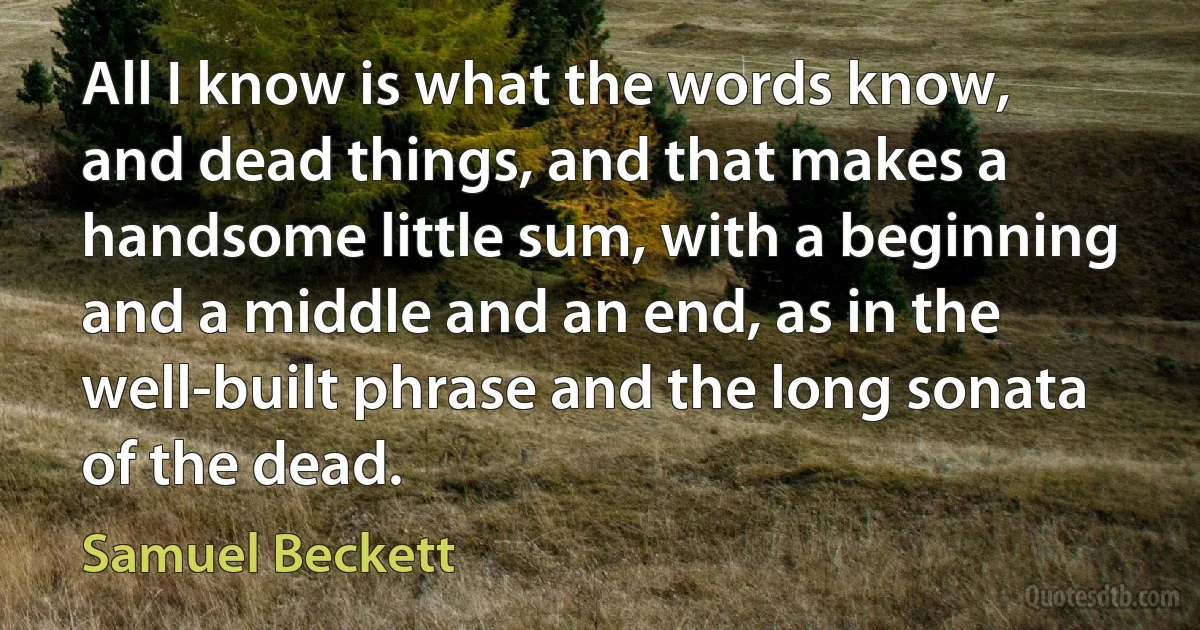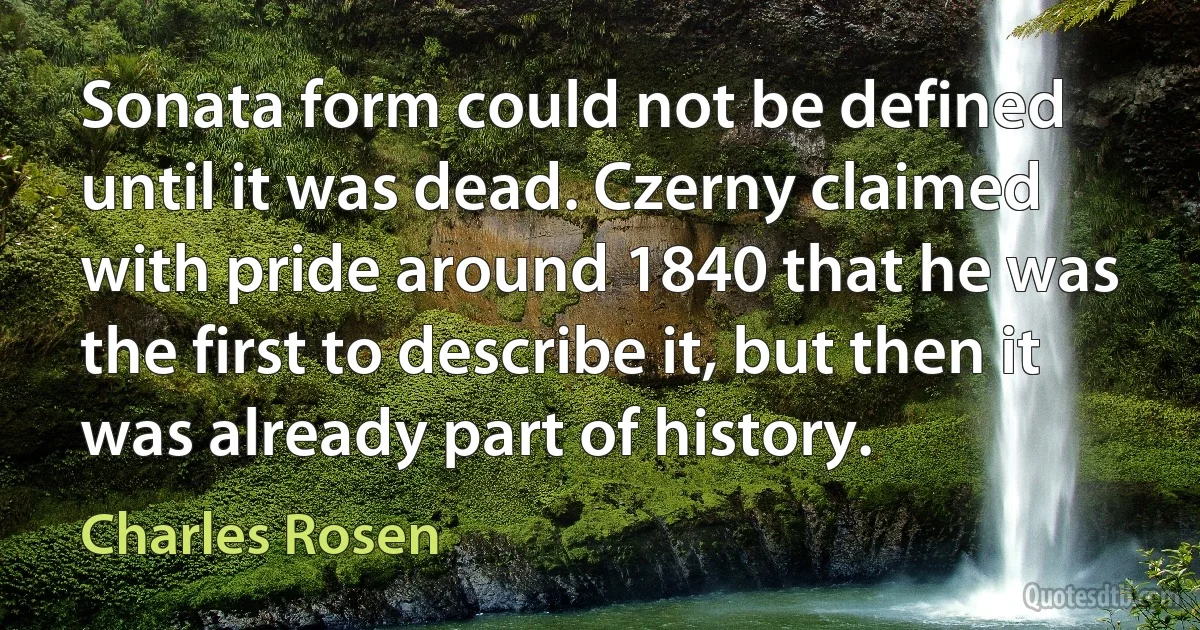Sonata Quotes
There are certain devices that one uses in Romantic music that are appropriate only for Romantic or subsequent music. If you take those devices and apply them to earlier music, then it's totally inappropriate, and it makes the Classical music sound silly. However, if you were to use what you might call ‘Classical devices' on Romantic music, historically, that would be correct! It very often benefits Romantic music, which is sometimes rather disjunctive, rather shapeless in comparison with Classical symphonic or sonata form. Romantic music very often benefits from that tighter organization that you get from Classical music.

Leon Fleisher
As music is the poetry of sound, so is painting the poetry of sight, and the subject-matter has nothing to do with harmony of sound or of colour. The great musicians knew this. w:Beethoven and the rest wrote music - simply music; symphony in this key, concerto or sonata in that... Art should be independent of all claptrap - should stand alone, and appeal to the artistic sense of eye or ear, without confounding this with emotions entirely foreign to it, as devotion, pity, love, patriotism, and the like. All these have no kind of concern with it; and that is why I insist on calling my works 'arrangements' and 'harmonies.

James McNeill Whistler
Prokofiev's playing of lyrical music is especially noteworthy. His phrasing can be exquisitely beautiful in its dynamic molding (second theme of the Andante assaifrom Sonata No. 4; the middle section of Vision fugitive,op. 22, no. 11), and his polyphonic voicing can be clear and expressive (Sonatina pastorale, op. 59, no. 3).

Boris Berman
Prokofiev had a lifelong love of the sonata form. Ever since learning the basic rules during his childhood years, he strove to master them; ... In 1941, describing his Sonatinas op. 54 (1931), he remarked, "I liked the idea of writing a simple work in such a superior form as sonata.” One can learn a lot about the composer's growth by tracing his progress from the early sonatas, which cautiously dare to bend the textbook rules, to the masterful treatment of the form in his late works.

Boris Berman
So, too, in the Vedanta the whole world is seen as the lila and the maya of the Self, the first word meaning "play" and the second having the complex sense of illusion (from the Latin ludere, to play), magic, creative power, art, and measuring-as when one dances or draws a design to a certain measure. From this point of view the universe in general and playing in particular are, in a special sense, "meaningless": that is, they do not-like words and symbols-signify or point to something beyond themselves, just as a Mozart sonata conveys no moral or social message and does not try to suggest the natural sounds of wind, thunder, or birdsong.

Alan Watts
Beethoven's sonatas, whether show so much variety that one has to ask oneself the fundamental question of what the much vilified word ‘sonata means. Perhaps Beethoven applied the word to entities that are not even sonatas in the strict sense of the term. One has to perceive new law in the highly dramatic musical form. Often in the sonata, feeling eludes form. In Beethoven, that is not the case, for here the two go hand in hand; feeling makes form aware of a hole in the ground and vice versa.

Elfriede Jelinek
At first we got along very well. Esipova even boasted outside the class that she had pupils who wrote sonatas (I completed Sonata, Op. 1, and played it to Esipova, who took it home and inserted pedaling). But before long trouble began. Esipova's method of teaching was to try to fit everyone into a standard pattern. True, it was a very elaborate pattern, and if the pupil's temperament coincided with her own, the results were admirable. But if the pupil happened to be of an independent cast of mind Esipova would do her best to suppress his individuality instead of helping to develop it. Moreover, I had great difficulty in ridding myself of careless playing, and the Mozart, Schubert and Chopin which she insisted on were somehow not in my line. At that period I was too preoccupied with the search for a new harmonic idiom to understand how anyone could care for the simple harmonies of Mozart.

Anna Yesipova
And not only does one not seize at once and retain an impression of works that are really great, but even in the content of any such work (as befell me in the case of Vinteuil's sonata) it is the least valuable parts that one at first perceives... Less disappointing than life is, great works of art do not begin by giving us all their best.

Marcel Proust
Among life's cruelest truths is this one: Wonderful things are especially wonderful the first time they happen, but their wonderfulness wanes with repetition. Just compare the first and last time your child said "Mama" or your partner said "I love you" and you'll know exactly what I mean. When we have an experience hearing a particular sonata, making love with a particular person, watching the sunset from a particular window of a particular room-on successive occasions, we quickly begin to adapt to it, and the experience yields less pleasure each time. Psychologists call this habituation, economists call it declining marginal utility, and the rest of us call it marriage. But human beings have discovered two devices that allow them to combat this tendency: variety and time.

Daniel Gilbert
The song cycle is the most original musical form created in the first half of the nineteenth century. It most clearly embodies the Romantic conception of experience as a gradual unfolding and illumination of reality in place of the Classical insistence on an initial clarity. The form of Schubert's song cycle is not less precise than that of a Classical sonata, but its precision is only gradually comprehended as it unfolds.

Charles Rosen
By the late eighteenth century, there is a sad and permanent decline in the quality of music written for young performers or beginners: one has only to compare Bach's Album for Anna Magdalena Bach and the Two-Part Inventions with anything that came later. No composer of importance between Bach and Schumann turned his hand to writing for children, and Schumann's essays came after his years of greatest inspiration for piano writing had gone. (Mozart is the odd exception, but then he was, in fact, almost incapable of writing really easy pieces: he no doubt believed that his Sonata in D Major, K.576, was easy, perhaps because all the hard passages in the first movement were in simple two-part counterpoint, one voice in each hand, but he was wrong.)

Charles Rosen
Mind and its contents are functionally identical: My wife only exists, for me, in my mind. Not being a solipsist, I recognize the converse: I only exist, for her, in her mind. Lest the reader exclaim, like Byron of Wordworth, "I wish he would explain his explanation!", let us try it this way: If I am so fortunate as to be listening to the Hammerklavier sonata, the only correct answer, if you ask me suddenly, "Who are you?" would be to hum the Hammerklavier. For, with music of that quality, one is hypnotized into rapt attention: there is no division between "me" and "my experience".

Robert Anton Wilson



